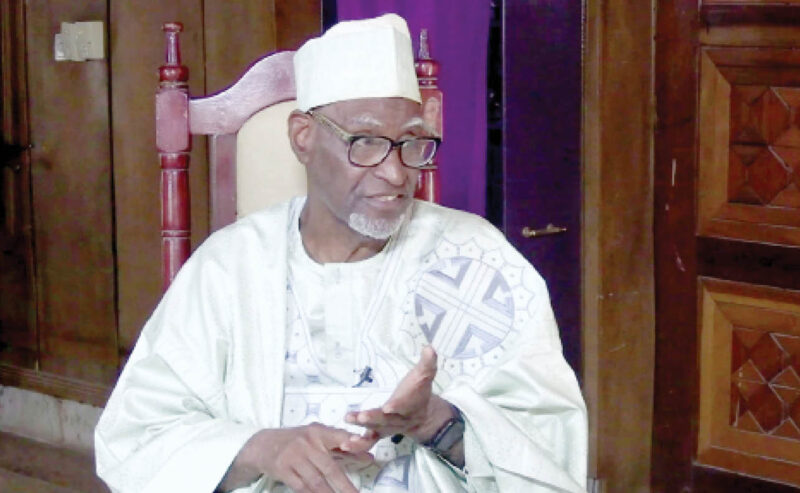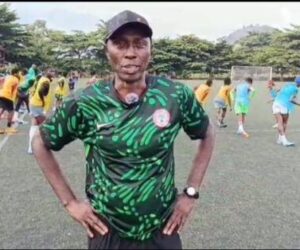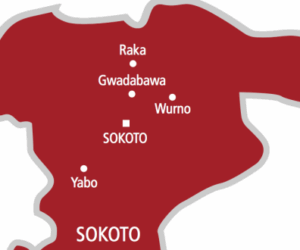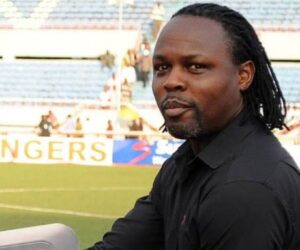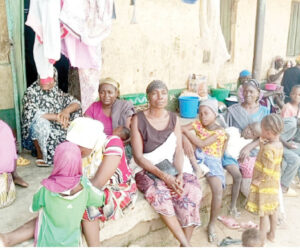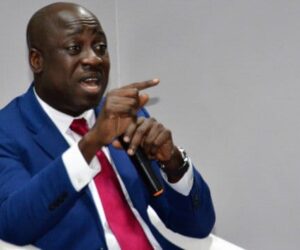Alhaji Lawal Sani, an accountant and administrator from Katsina State, worked in the Katsina Native Authority, and as a district officer in many areas in the old Kaduna State, before rising to the level of under secretary. From 1981 to 2001, he was in the banking industry, rising to the level of deputy general manager of the Union Bank. He capped his career in banking with an appointment in the African Development Bank(AFDB) in Abidjan, where he represented Nigeria as an executive director between 2001-2007. He was also a non-executive director in Zenith Bank. In this interview he shared these experiences.
Let’s start from home, there is another Alhaji Lawal Sani Store, who is your brother. How do we distinguish between these two Lawal Sani’s?
SPONSOR AD
Our father had a lot of children. In fact, he died leaving 50 children – males and females – including me, my two elder brothers, Shehu and Abdulaziz, then Lawal, who is now called Lawal Sani Store. I decided to retain my name as Lawal Sani because there could be a lot of confusion. He decided to call himself Lawal Sani Store, because his mother actually requested my father to name him Lawal, though I was there.
My father had a lot of duplicates; in fact, we have Maimuna 1 and Maimuna 2; as well as Farida 1 and 2 etc. Maybe because there was a lot of gap between them and he could not remember that he had one already! So, I and Lawal agreed that I call myself Lawal Sani for and he took Lawal Sani Store.
I think your father’s name is Alhaji Sani Store; how did that name come about?
We were told that in his young days, he started with the Katsina Native Authority – Ministry of Works. During his career he was found to be a very honest young man, so the Native Authority appointed him as a storekeeper in charge of the Ministry of Works. And there was a lot of activities during his days, a lot of resources.
Our fathers and grandfathers were very meticulous, such that before they made you this, they made sure you were worthy of that kind of thing. We were told that because of his honesty etc, he was made the storekeeper of the then Ministry of Works. That name followed him all around. Even when he retired from the Native Authority, he was still known as Sani Store – Sani the storekeeper. That name followed him up to his death.

And some of his children also took the name?
Most of his children. Actually, because of the duplication, I decided to remain Lawal Sani. Our younger brothers, such as Lawal Sani Store, who is now the Turakin Katsina, decided to accept the name.
Let’s go back to your early days.
When we finished primary school, I was told that I came second in the whole Katsina Province. Hassan Remawa was number one while I and Lawal Bagiwa were number two. He is still alive.
The former Customs guy?
Yes. He was third in the common entrance. Normally, I and Hassan would have been sent straight to Barewa but because of physical appearance. He was even taller than me while I was taller than Bagiwa. The then headmaster, Alhaji Abdurrahman, may his soul rest in peace, decided to send me and Hassan Remawa to the Kaduna Training College, because in his view, we were already grown-ups, so we could teach. They sent Lawal Bagiwa to Government College.
Unfortunately for me, when I completed what they called Grade 3 teacher’s course, there was some kind of in-between one year to two years, where you were supposed to go and teach, then roll back into Grade 2.
At that time, which was between 1962 and 1963, the then Northern Nigerian Government came out with a report led by one expatriate, which recommended that they should stop the bridge course. So, all of us became stranded because we could not take exams and go to Grade 2 teachers’ college.
So I applied to join the Katsina Treasury and was appointed as a clerk and sent to the Institute of Administration, Kongo, Zaria, where I did an intermediate and senior accounting course, then what they called diploma in Treasury Management.
I was a bit lucky and had what they called credit offer diploma, so when I came back to Katsina, I was appointed as an accountant. I served for two or three years, then they created North-Central State, which combined the two provinces – Katsina and Zaria.
On the drive for recruitment, I was one of those who were picked from the Katsina Native Authority into the( North Central) government as an accountant.
So you moved to Kaduna?
We moved to Kaduna in 1969 or so. There, I was working in the Ministry
of Finance, under Tijjani Malumfashi, I think. He was the permanent secretary. I was nominated for the administrative management course with among others Alhaji Anas Musawa, who is still living. They called it ADO’s course.
We went to Kongo, (ABU, Zaria) for the course, after which I was appointed as a district officer in charge of the Saminaka administrative area. After serving for one or two years, I was moved to Funtua as a district officer(DO).
My impression was that the post of a district officer existed in the colonial times; I am surprised that it continued even into the 1970s.
It continued.
Was the position like that of a local government chairman?
No. There was a local government chairman, but I was a government representative in charge. I was there until 1974 or so. Then I was moved back to the Governor’s Office in Kaduna and subsequently moved to the Ministry of Agriculture as an under secretary.
Tell me about your experience in the Governor’s Office as principal private secretary to the governor.
When I was with the governor – the late Usman Jibril – I had a private secretary under me. I was like the principal secretary in the Government House. One colleague of mine, Tanko Teti, was the private secretary. I was actually like the chief administrative officer in the Governor’s Office.
How would you describe working with(Group Captain) Usman Jibrin. Did you have difficulties working with him?
He was very religious, strict and transparent. There were times when we ran short of money to run the Government House and I told him that I was going to the Ministry of Finance, but he said it was my problem because as principal secretary I coordinated all the financial activities of the Government House through the Ministry of Finance. When I was told that we ran short of funds to run the Government House, the late Abbas Rafindadi was the permanent secretary.
I had to go to him and convince him because he was a hardcore too. He was just like Usman Jibril. He said, “No, Alhaji Sani, we are not going to give you any more money.” But I told him that if he saw the way Usman Jibrin was running the House he would respect him. So he agreed to give us more.
So the governor would not ask his permanent secretary to give him money to run the Government House?
No. We ran short of money and I had to go and beg my boss, the permanent secretary in the Ministry of Finance and convince him to add more money to the Government House.
When you were in the Government House, there was this controversy between him and Obasanjo over Radio Kaduna; what happened?
There was one permanent secretary or minister of information; I can’t remember his name, who decided to take the shortwave facility of Kaduna Radio because at that time, the station was heard all over West Africa. You could go to Ghana and Liberia and listen to Radio Kaduna.
So, politically, there was something they wanted to stop because Radio Kaduna was becoming an institution and everybody was listening to it.
Maybe Ayo Adebanjo, the federal commissioner of information?
Ayo something; I can’t remember. He was the one who tried to take the shortwave and bring the FM because, according to him, all the radio stations were on FM frequency, except Kaduna. But the station was even heard beyond West Africa. There are lots of Hausa-speaking people in Ghana and Liberia – everywhere – so everybody was listening to Radio Kaduna.
Usman Jibrin vehemently disagreed with the plan to take over the radio station. In fact, he threatened to resign but he was prevailed on. I think he had even tendered his resignation.
From your job as a principal secretary you moved to the banking sector in 1981. What triggered that movement
What happened was that Union Bank was looking for somebody with a personnel background. They approached the late Isa Katsina but he said no – he didn’t want to go to Lagos.
One of the executive directors of Union Bank was Ahmad Maiyaki. I went to Magaji Inuwa who was his colleague in Barewa College. He said they were looking for a personnel man and Isa said he didn’t want to go to Lagos, but ‘here is Lawal.’ That’s what motivated me to go and have an interview for the position of assistant general manager, personnel.
When I went, there were lots of intrigues within the establishment; so, instead of giving me the position of an assistant general manager, I was just given a principal secretary or something like that.

Principal manager?
Principal manager; which was fine. And I stayed for about five years before I was appointed as assistant general manager.
Alhaji Isa Katsina didn’t want the job because at that time Lagos was not a place for northerners, but you didn’t mind going there; why?
I accepted to go to Lagos because it was a challenge.
How was your stay in Lagos?
I was supposed to go to Surulere but I said no – I wanted Ikoyi, even if it was a boys’ quarters.
You didn’t like Surulere?
At that time, if you were living in Surulere, every morning you had to wake up by 5 o’clock or 4 o’clock to start going to the office. I knew about that, so I said I was not going to the Mainland. I preferred Ikoyi, even if I was given a small flat. That’s where I stayed until gradually, they appointed me as assistant general manager. Subsequently, after a couple of years, I was appointed the deputy general manager and moved to Bourdillon initially. From Bourdillon, I was given a house at Lugard( Avenue ).
Did you move to Lagos with your family straightaway?
I moved with my family. I had two wives, so we decided that the senior wife would stay in Kaduna because some of our children were schooling there. I stayed with Zainab, in Lagos. It turned out that every two weeks I would fly into Kaduna on Friday and go back on Monday.
How was the experience generally at the Union Bank? You spent 20 years there, more or less; were you satisfied?
I was lucky to have been subjected to basic training as a clerk. I went to a training school to learn about entries, bookkeeping etc. I had gone to almost all the basic courses because I was not a banker; I was just an accountant.
I was appointed the deputy general manager because I had gone through all the basic training – all the banking courses. I had been to Manchester for a senior bankers’ course so many times.
You see, one thing with me is that I believe in training. I believe in enhancing my potential. In my curriculum vitae you would see that I have gone to almost all the courses you know a banker should do.
Later on, when they appointed me as deputy general manager, they moved me to what they called Special Assets Department, which is conventionally known as debt recovery unit.
I was there for a couple of years; then they created a Public Sector Department and I was moved from the Special Assets Department to that place because they realised that I was very good at human relations.
The position was just for assistant general manager, but because I was a deputy general manager, they elevated it. I did a lot of work for them. I was able to get NITEL accounts etc.
Did the position require you moving to Abuja?
Yes; because Abuja was the key.
Were you happy to move away from Lagos?
I am a very flexible personality. And maybe I didn’t have a lot of baggage to carry, in terms of family.
But somebody would say that two wives were a lot of baggage?
Well, I told you that the senior one was in Kaduna in charge of schooling and so on. When we moved to Abuja, I was given a house in Asokoro. We lived there as a very happy family. I believe in challenges; so anytime somebody was told to go, I would go.
I forgot to tell you that before I moved to Union Bank, it was the then Kaduna State Government that supported me to go and
read for a master’s degree in Public and International Affairs.
In Pittsburgh?
In Pittsburgh. We stayed there from 1978 to 1980.
You were a fairly senior civil servant with a large family going back to school for a master’s degree in the US; was it difficult for you?
From my curriculum vitae you will see that no course was too smooth for me. I told you that when I was training in Union Bank, I attended a clerk’s course in the training school. I believe in enhancing and empowering myself.
How was your experience in America for the two years?
The school’s name was Graduate School of Public and International Affairs. At that time, Pittsburgh was number six in the university ranking in the whole country. So, it was a very strong university. We spent two years.
Did you enjoy your stay? Was it difficult for you?
I don’t believe in difficulties. In fact, I look for difficulties to go into. When I was there, we arranged with the family; In the first year I went with my junior wife because the senior was pregnant. Then later on, before she returned we had Abdulaziz. So I enjoyed my stay.
No discrimination?
Even today, there is discrimination in America. It manifests in a lot of ways – some are apparent while some are concealed.
There was a time I was looking for a house when my senior wife joined me with two children – Umar and Zainab – but they didn’t like children in their houses. However, at the end of the day, we got one where you could walk to the university.
Discrimination is an inherent kind of mindset among some Americans, especially against blacks.
You later moved from Union Bank to the African Development Bank (ADB), which was an international job outside Nigeria. How did that come about?
The minister of finance, Adamu Ciroma, knew me very well because I have a very close relationship with people from Potiskum.
The banker ( who was leaving) was a Kano man, Dr Baita Yusuf. They asked for my curriculum vitae and I gave them. I was then in Union Bank. He( Adamu Ciroma) recommended me to the government and they approved. He was the governor of the bank; each minister of finance was a governor.
I was appointed an executive director for the initial three years. By the time I spent three years in the ADB, he was no longer the minister; it was Ngozi Okonjo- Iweala.
We had a lot of understanding because she found me as an elder and sought a lot of advice from me, both personal and official. She agreed for me to continue the second term.
How challenging was the appointment, especially living in Abidjan?
To be an executive director representing Nigeria was an enormous responsibility because, first of all, Nigeria had the largest share, so if I said no at the board, it was no.

Your voting power was a lot?
I had 10 per cent; the highest was America. During my second tenure, I was even the dean of the executive directors, which was the big one; that is the head boy.
I was the oldest and the voting power of my constituency was big. So I was the dean and for anything administrative they would come to my desk. It was a very challenging responsibility.
Apart from the challenge of the job, was it challenging living in Abidjan?
Yes and no. Abidjan was one of the best organised West African cities then because they didn’t have NEPA problem. They had electricity 24 hours daily. They also had 24 hours of water.
Before the political crisis became enormous for the bank to decide to move out of Abidjan, it was a beautiful place. They had fruits, bananas, everything you were looking for.
When the crisis came, the political crisis made us – as a Board in the ADB – to agree to move to Tunisia. In fact, the initial recommendation was Morocco, but because the then managing director of the bank was a Moroccan, he said no. So the Board decided to move to Tunisia.
How was the move to Tunis? How was the experience?
As a Board we decided to go out because the crisis was getting out of hand. Some said we should move to Ghana but some said we needed to move away from West Africa. The Board of Governors also agreed. We had limitations when it got to this kind of decision.
The Board of Governors agreed that we should move to Tunisia. And in Tunis, well, it was a wise movement. It was very free, but the local people initially didn’t like us because there was a bit of racism in Tunisia.
You see, workers of the ADB were very affluent people. Most of them went in Mercedes, BMW etc. ( inTunisia) the highest car you could have then was Peugeot. Most people went in( Peugeot) 206, 207 etc. However, there was resentment, but no harassment . The Arabs have a peculiar problem with the black man. It is a fact of life. So we had a little bit of resentment, but we forged ahead. I think we stayed five years there.
You mentioned affluent bankers in Tunisia. Is it fair to say that you had made a lot of money at the end of your two terms in ADB?
Well, one thing I respect about the ADB is that they were very strict and transparent. When we went to see our constituency sponsors, like going to Abuja or Sao Tome, which was one of my constituencies, you had to do a circular and all the executive directors had to note.
There was one time a French executive director objected to my going to Abuja, saying I was out almost every month. Unfortunately, at that time, there was no direct flight from Tunisia to Abuja, so you had to go to France, Amsterdam or London.
So you had to circulate a memo for all the executive directors to approve?
They would approve before you would leave. That’s why I said one of the things I like and respect about the ADB is that they are very transparent when it comes to management.
But your formal working career ended at the ADB, right?
Yes.
Did you have enough to retire comfortably?
I am not sure I retired comfortably.
The salary was in dollars, of course?
My terminal benefit was used to pay for my mortgage to acquire a house where my wife is right now. I didn’t have the money to build.
Acquire a house where?
Houston.
In the USA?
When I finished my second term, I was paid what they call disengagement.
Terminal benefit?
Terminal benefit. My terminal benefit was used to acquire a house and pay 50 per cent of the mortgage. I am still paying after how many years? 2007 till date. I am still paying.
Why America?
Because some my children, Abdul and so on were there. And weather-wise, Houston is like Lagos – it is never too cold. It is almost the same with Lagos weather.
So when I went there with my terminal benefit, I entered into mortgage. I have a comfortable house there with my wife. She is still there.
It takes a very rich banker to retire in America; do you agree?
Yes and no. I was born rich but I have never been rich. I mean I don’t believe in being rich; I believe in surviving with minimum comfort. I never saved money to buy this or that. That’s why the terminal benefit I had was big enough to pay 50 per cent of my mortgage. I wish I paid all because I am still paying.
So how do you cope since you are not working in the banking sector?
I cope because one of my children. Abdulaziz has a good job in one of these oil companies.
There in the US?
In the US. He has taken over the payment of my mortgage; and I am comfortable with that.
How is life in America for you as a retiree?
Even in Katsina, I hardly move out of my house. I only move out when there is a wedding ceremony or funeral. I am always here or at the other house. In fact, most people do not know I am in Katsina.
So for you, living in America then was just like home?
Honestly speaking, I hardly do anything. I am not employed. I consider myself unemployable. Also, the county dishes out a little bit of maintenance for retirees. Once you are 65 you are a senior citizen.
So you enjoy that?
Yes, kind of. At least they chip in a small bit of something; you can go and buy grocery with what they give you.
It is a kind of welfare allowance or something like that. Of course there’s medical advantage. Medical is 100 per cent free for me because once you are 65 and you are legally a resident, the county council pays off your medicals. In fact, if I go into my computer now and intend for fresh medication, it will be delivered to my house within the week, free of charge.
Even from here?
From here. I have a house there, so all I need to do is go to the site and say, “Please renew my prescription.” They will send it to my house without payment. That’s why people are wondering why I am always in America. It is because my health is primary. You don’t have a problem there.
As an elder in Katsina, where I have just met you, how involved are you in the affairs of the state?
Fortunately for me, I have never joined any political party, from 1963 when I started work till date, but I vote. Each time it is time for voting I will go and see who my conscience says I should vote for. I have been voting. I have never, and I will never join a political party.
Why? You are a trained public administrator.
Yes. But you see, I am incompatible with politics.
Are you happy with the way the country is being run, politically?
I am not a politician and I don’t want to engage myself into politics. But I have no qualms with what is going on now. People decide to elect A and A is there, that’s their problem. I always go to the polling station to vote my conscience.
You have been around from the 1960s; would you say the country is making progress? What have you seen?
I am happy with the way things are now, but there are areas I would want to advise the administration to take into account. For instance, there is this Hausa-Fulani matter that is manifesting into a very serious problem. There are some groups of people who call themselves Hausa, who are dishing out vile and hate speeches abusing the Fulani etc. I don’t like that because the Hausa and Fulani are one. Believe it or not, there is no house in northern Nigeria that you don’t find Hausa who are Fulani.
It is not safe for a group of people who call themselves Hausa to start articulating hate speeches. It is not advisable. I hate a situation where we have a repeat of what happened in Rwanda. Hutu and Tutsi and just like Hausa and Fulani. You can see what transpired there.
I am pleading with the authorities to start paying attention to what is going on because we don’t know when it will blow out. And when it blows out, you can’t distinguish between the Fulani and the Hausa man.
People say it has already blown out in the villages and that’s why you have this banditry and killings going on.
In fact, in one social media broadcast I heard that somebody was saying that when you come out and see a Fulani man, kill him. How can we go to this extent?
As an elder, I want to plead with those elements to exercise caution because we don’t want a repeat of what we saw in other countries like Rwanda. It can happen, God forbid.
What else are you not happy about in the setup of the country?
The poverty level in this country is alarming. I can tell you that every morning, when I sit out there, somebody will just find out and say, ‘I heard you are here; let me tell you that today I have not taken a bite in my house, please give me something.’ And it is a daily occurrence, which tells you that people are really suffering.
I don’t believe that buying rice and dishing it out is the solution. Empower people. Bring industries and employment to people. As they say, instead of catching fish for someone to eat, show them how to go and fish.
People are not employed. Millions of Nigerians are looking for employment but there is none. And that is worrying.
I am not blaming any government, but it is a fact of life that people are not employed. And once you have a situation where the youth are unemployed, you start creating a problem.
As a Katsina elder, what advice would you give the government and the people in power at all levels?
I used to be a member of the Elders Forum in Katsina, but they don’t know whether I am here or out of the country. Some of the time, the secretary will just call other people, but I would announce to them that I was around. Those days when the Galadiman Katsina was the chairman of the Elders Forum, I was always invited. But because I am not usually around, they do their meeting without me.
But if I find an opportunity to talk, like I am talking now, I will say you guys should start addressing this ethnic problem. It is very serious.
It is just like the South-West where you cannot get a house where there is no Muslim and Christian. It is the same thing in the North-West – there is no house where there is no Hausa and Fulani. My mother is Fulani and my father is Kanuri.
The Fulani man I know is peaceful. Do I have a problem with you as a Fulani man? No. A lot of colleagues of mine are Hausa and I don’t have a problem with them. So I am appealing to those people who are dishing out that kind of hate speeches to refrain because we have seen what happened in other countries. It is a very serious issue.
What do we do about poverty; which is the second problem you mentioned?
Well, the government is trying because I have seen them dishing out food. But I think they should address empowerment more than dishing out handouts. I am appealing to whoever is concerned to address empowerment and create employment so that people can feed.
As somebody who lives in America, do you think the Nigerian government can really do that? Shouldn’t the people help themselves rather than waiting for help from the government?
Of course the government can do something. Yes, they can empower people. I mean, it is one of their programmes to empower people. They know how to go about it.
Tell us a little bit about your private life. Your father had so many children; do you also have a large family?
I have surviving 40, plus brothers and sisters. But thank God that most of them are on their own. They have either trade or employed by this or that.
But there are challenges. Of recent, I was told that one of my brothers was having a problem and he had to be taken to Kano. I told them that we have(a) Foundation, so they should look at our money and not rely on me because I may die today. If you have that kind of foundation that trickles in money, use it.
Sometimes when they come to me as an elder, I try as much as I can to help, but I keep on telling them to go and get employment, do trading etc. Don’t believe in being fed.
How big is your immediate family?
I have four wives. Three of them are in Katsina. The most senior of them is not well. Then there is another in my other house.
And there is one in the US?
Yes, there is one in the US; I am comfortable.
How do you spend your day, wherever you are?
That is why I said that unless there is an occasion for me to go out, I move from my bed to that chair – make ablution, come out and pray. Tomorrow there will be two weddings, in Barde’s house and Matawale’s house, otherwise I don’t go anywhere.
What do you do to while away time? What are your hobbies if I can call it that?
Reading the Quran and social media comments because it is essential – you have to know what is going on. Friends also visit me – they come and go.
Do you still have friends and classmates around?
Oh yes. Within Katsina I have six or so classmates( from) senior primary school. We still interact and engage ourselves etc. I am generally happy.
Do you have any exercises, especially as you grow more elderly?
I walk. Sometimes I walk from this house to the other house over there. I walk out here and come back this way, that’s all. I don’t do physical exercise anymore because I am too fragile for that.
What of diet; are you restricted?
I am diabetic, so there are certain elements in food that I don’t take. But I control myself. Every morning I take at least two anti-diabetic tablets. I don’t have restriction on diet. I eat rice, potatoes, beans etc. I have no problem with diet.
Thank you for letting us into your life.
It is my pleasure.

